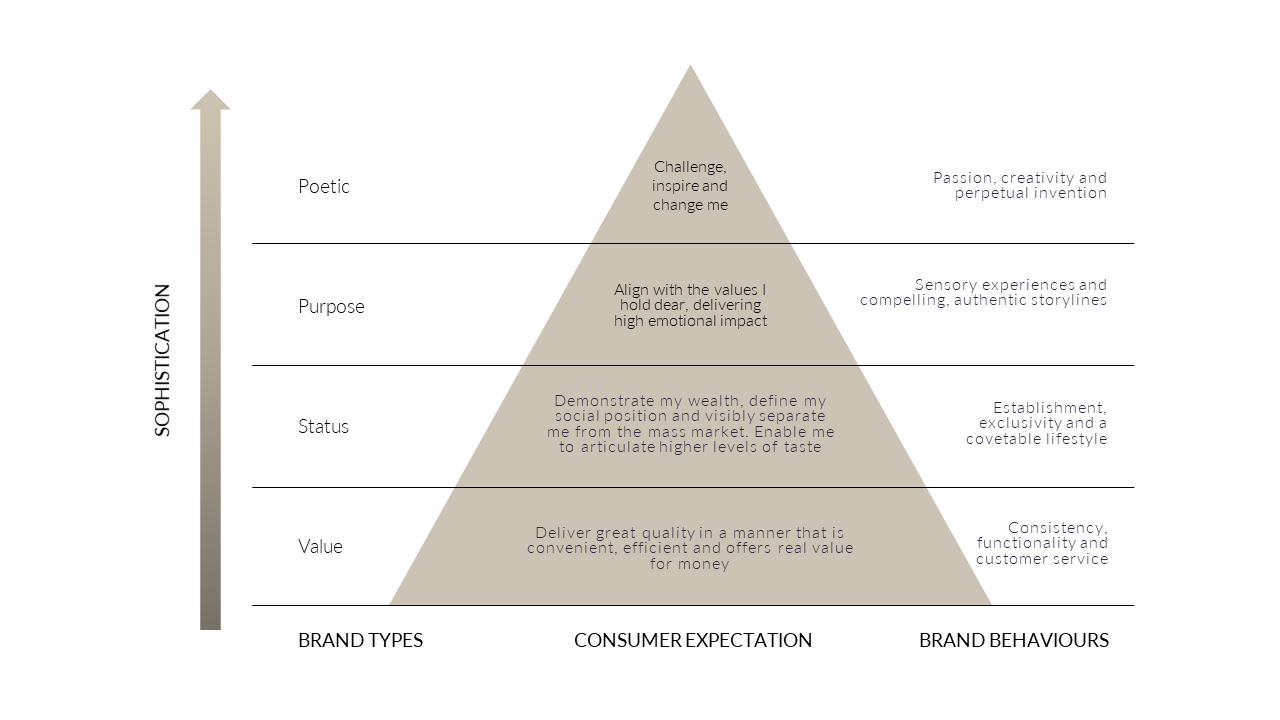What has the Coronavirus pandemic meant to the wealthiest among us? Cream Co-Owner & Chief Strategy Officer, Charlotte Parks-Taylor explores how affluent consumers are re-evaluating what truly makes them happy.
In light of the COVID-19 pandemic, Bain & Company published a study predicting the collapse of the luxury sector with a drop of up to 35% during 2020, and a full recovery unlikely until 2022. An obvious trigger for the downturn is of course the huge impact on freedom of movement and physical lockdowns across the globe; however the report also cited changes in consumer psychology such as increased frugality and a more cautious approach to spend as key factors in the overall economic impact of the pandemic.
Anxious as all consumers
Affluent audiences now find themselves as anxious as all consumers, not only owing to macro-economic uncertainty and lack of job security, but importantly the existential and omnipresent health threat of a virus that we hold little collective knowledge of.
Fear is now the dominant emotional state that unifies us all, regardless of the level of comfort or wealth which may surround our personal experience of the pandemic.
Even for the wealthiest and most discerning of consumers, their priorities have shifted to more fundamental needs. As CEO of Walpole, Helen Brocklebank, eloquently put in her letter in the Sunday Times, ‘luxury in a time of necessity feels like a contradiction’. People have realised that perhaps the things that they thought defined their happiness hold very little value in the current climate, or in fact never truly mattered at all. Either consciously or subconsciously millions of minds have been ruminating over ‘what is happiness for me?’.
No going back to normal
This fundamental shift in self-awareness will undoubtedly have a huge impact on economy, but importantly for brands it will also begin to influence the way audiences interact with advertising, social media, influencers, and all other brand interactions. Regardless of how long restrictions of movement and social interactions last, for most there is no ‘going back to normal’. A recent YouGov survey even suggested that only 9% of Britons want life to return to ‘normal’ after the coronavirus outbreak, highlighting how many have taken the opportunity reflect on the shortcomings of our previous way of living.
Where we now find ourselves is in a collective prioritisation of what it is in life that makes us truly happy. In a ‘Marie Kondo-ing’ style exercise, we see affluent consumers narrowing in on the habits, relationships, and brands that either fulfil a functional role, or truly ‘spark joy’ in their lives. If you have managed to live without something for the last 6 months, did you really ever want or need it?
Building intrigue and maintaining relevancy
In Cream’s perspective in the IPA's Affluent Consumer Audience Profile we discuss the importance of truly understanding what your audience is seeking from each interaction with your brand. Based on Maslow’s hierarchy of needs, we see affluent consumers continue to develop increasingly nuanced expectations from the brands they choose to interact with and invest in, as their needs become more sophisticated. The challenge for brands therefore, is to continue to build intrigue and maintain their relevancy throughout this journey, adapting their messaging to appeal to different consumer need-states at each stage.

The collective ‘recalibration of happiness’ we are experiencing will undoubtedly hold an accelerating effect on consumer sophistication. Affluent audiences will be seeking something beyond a badge of status from their interactions with brands, instead looking for businesses who align to values they care about, and those who offer true passion & creativity in their endeavours.
Curating new definitions of happiness
Success in the short term may derive from an elegant blend of messaging which covers the functional ‘value-add’ of the product or service, hand-in-hand with the deeper and more ‘poetic’ message which speaks to the superior joy and happiness which will be delivered. Going forwards however, brands will need to navigate this new landscape with care, but also with great self-confidence. A keen understanding of how your brand adds value beyond the functional will become paramount, as there is less money in consumer ecosystem, more caution in purchase decisions, and people more self-aware of their own needs for happiness. For luxury brands, a confident articulation of who you are, and the inherent ambition and creativity behind your brand will resonate with affluent audiences seeking to curate new definitions of happiness.
Charlotte Parks-Talyor is Co-Owner & Chief Strategy Officer at Cream. Cream contributed to the IPA's Affluent Consumer Audience Profile.